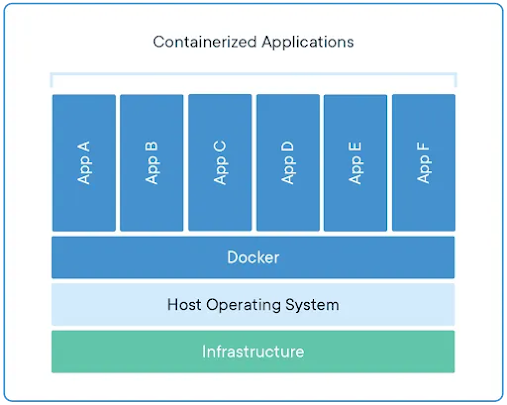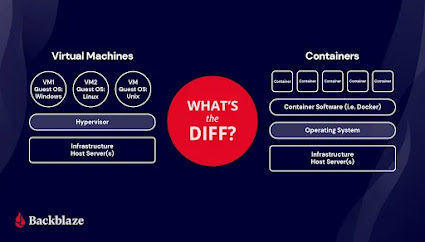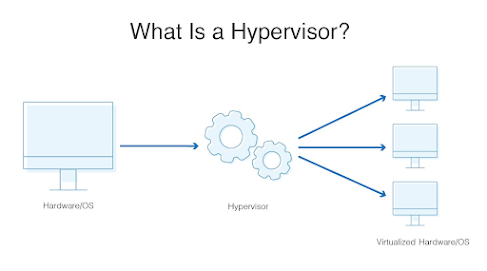Hello guys, if you are preparing for DevOps Engineer interview or a Software
developer job interviews like Java developer then preparing about Docker is a
good idea. Docker has become an essential tool for packaging and deploying
Software, particularly
Microservices, and you can expect a couple of questions about Docker during Interview to
check your knowledge. Having absolutely no idea of Docker before going into interview can be detrimental to your prospect
considering the importance of container on deploying apps and services on
Cloud. That's why I always programmers and developers to prepare Docker
interview questions and revise key Docker concepts before
interview.
If you are wondering where you can find Docker interview questions then don't
worry, in this article, I have shared common Docker related questions you can
prepare for interviews. They are also great to revise key Docker concepts
before interviews and they cover essential areas.
If you don't know what is Docker then let me give you a brief overview. Docker was first introduced in 2013 and has since taken the IT world by storm. It has become a big hit with customers and as of 2018, it has more than 9 billion container image downloads.
If you don't know what is Docker then let me give you a brief overview. Docker was first introduced in 2013 and has since taken the IT world by storm. It has become a big hit with customers and as of 2018, it has more than 9 billion container image downloads.
What this means for job hunters like you is that there is an ever-growing
demand for software developers skilled in Docker.
Docker streamlined the
development and deployment of Software application as you can deploy both
C++ and Java Microservice in same way as Docker image and Kubernetes can also scale them without worrying whether they are
Java or C++ application.
This article will teach you everything you need to know about Docker. The article is made up of the 20 most important Docker interview questions. Using this article, you will be able to ace your interview, impress your potential employers, and land your dream job.
What this means is that containers can be scaled to such a degree that you can have thousands or even millions of containers running in parallel.
As regards requirements, you will need to have enough memory and other OS requirements to make sure that containers are effectively scaled.
This article will teach you everything you need to know about Docker. The article is made up of the 20 most important Docker interview questions. Using this article, you will be able to ace your interview, impress your potential employers, and land your dream job.
20 Docker Questions with Answers for 1 to 3 Years Experienced Developers and DevOps
This article covers some of the most frequently asked interview questions
related to Docker. The questions cover basic concepts like containerization,
virtualization, and hypervisor, as well as advanced topics like Code
Pipeline Management and Application Isolation.
For easy access, I have divided this article into 3 sections. The first
section includes Basic Docker Questions relating to concepts like
virtualization, hypervisor, and containerization.
The second section takes it up a notch and introduces you to some Advanced
Docker Questions. You will learn about things like Code Pipeline Management,
Developer Productivity, and Application Isolation.
The third and final section will teach you about some Basic Docker Commands.
Since most of the interviewer looks for hands-on Docker skills its important
to remember and practice essential Docker commands. In this section You will
learn how to start, stop, and kill a container, as well as list all the
running containers.
1. Basic Docker Questions
Docker is basically an open-source containerization platform. What this
means is that it helps developers to divide applications into different
containers.
1. What is Docker?
Since this will be an obvious question, we will start with a small
definition. Docker is a containerization platform that you can use to
package your applications and their dependencies together in the form of a
container. This will help ensure that your application works smoothly in any
environment.
2. What is a Docker Container?
Docker containers are made up of the applications and all of their
dependencies. In simple words, Docker containers are runtime instances of
Docker images. They run on any computer, on any infrastructure, or on any
cloud.
3. What is Containerization?
In software development, it is common that code developed on one machine may
not work on another machine. This is because of something called
dependencies. The concept of containerization was developed to solve this
problem. What this means is that an application is effectively bundled
together with all of its configuration files and dependencies. Docker is one
of the most famous containerization platforms.
4. What is Hypervisor?
A hypervisor is a piece of software that makes the process of virtualization
possible. Another name for a hypervisor is Virtual Machine Monitor. It is
responsible for dividing the system and allocating resources to each divided
environment. What this basically means is that you can have multiple OS on a
single system.
5. What is virtualization?
The process of creating the virtual version of something is known as
virtualization. This can be computer storage, servers, or applications.
Virtualization allows developers to divide one system into many different
sections. Each of these sections can act as a single system. A software
called a hypervisor makes this possible.
6. What are Docker Images?
A Docker image can be called the source of a Docker container. What this
means is that Docker images are used to create Docker Containers. When a
developer runs a Docker image, an instance of a Docker Container is
created.
7. What is Docker Hub?
Docker Hub is kind of a registry where all the Docker Images are placed.
Developers can select images from Docker Hub and use them to create
containers or other images. Docker Hub is the world's largest registry of
image containers.
2. Advanced Docker Questions with Answers
Interviewers will ask questions from this section to check your experience
of working with Docker. Once your interviewer realizes that you are familiar
with the basic concepts of Docker, they will move on to some more advanced
questions. This section of the article will help you understand some
advanced Docker concepts.
8. How is Docker different from other containerization methods?
Even though Docker is by far the most famous and efficient containerization
method in the world, it is not the only one.
What sets Docker apart is that
Docker containers are easy to deploy in any cloud platform.
This means that
you can run more applications on the same hardware. It is also easier to
quickly create containerized applications.
The process of managing and
deploying applications is also more efficient. You will also be able to
share containers with your applications.
9. How far do Docker Containers scale? What are the requirements?
Most of what you see on the internet, including websites like Google and Twitter, runs on container technology.What this means is that containers can be scaled to such a degree that you can have thousands or even millions of containers running in parallel.
As regards requirements, you will need to have enough memory and other OS requirements to make sure that containers are effectively scaled.
10. What platforms does Docker run on?
Docker runs on a multitude of platforms. You should make sure that you
mention the platform that the company you are interviewing for uses in your
answer.
Docker can be used in cloud platforms like Amazon ECS, Amazon EC2, Microsoft
Azure, Google Compute Engine, and Rackspace.
It also runs on Ubuntu, ArchLinux, OpenSUSE, CRUX, Fedora, RHEL, and
Gentoo.
11. How do you identify the status of a Docker Container?
There are six states that a Docker Container can have - Created, Running,
Paused, Restarting, Exited, and Dead.
You can use a command like '$ docker ps' to check the current state of a
container.
You also need to understand that you cannot remove a paused container from
Docker. The container should first be stopped before it can be removed.
It is also not possible for a container to restart by itself.
12. How many Containers can run per host?
The cool thing here is that you can run as many containers as you want.
There are no restrictions on Docker. But you should note that every
container needs storage space, memory, and CPU. So you should make sure that
you have the necessary hardware before running a container. You will also
need to consider the size of the application. Containers are mostly
lightweight but it depends a lot on the host OS.
13. Will Cloud overtake the use of Containerization?
Docker containers are gaining popularity. Cloud platforms are also on the
rise. As you are interviewing for a Docker position, you should say that
Docker will never be replaced by Cloud. You should also be able to back up
your opinion.
Companies should take into consideration all of their requirements before
deciding whether to go with Docker or Cloud. Most companies these days have
integrated Docker with Cloud. This will make it possible to get the best of
both worlds.
14. How will you monitor Docker in production?
There are many ways to monitor Docker in production. Docker provides many
functionalities like Docker stats and Docker vents to do the same.
Docker stats will give you the CPU and memory usage of an application. You
can use Docker events to gain information about the different activities
taking place in Docker.
3. Basic Docker Commands Interview Questions
Once your interviewer realizes that you have a strong theoretical
understanding of Docker, they will increase the difficulty to test your
practical experience. This section of the article will teach you about some
of the basic Docker commands. You can use your knowledge of Docker commands
to impress your interviewer.
14. How do you find out the number of running, paused, and stopped Containers?
You can use the following command to check the number of containers running,
paused, and stopped.
$ docker info
15. How do you login into the Docker repository?
You can use the following command to login into the Docker Hub.
$ docker login
After typing this command, you will be required to enter your username and
password.
16. How can you make modifications to a base image and customize it?
First, you will need to pull an image from the Docker Hub into your local
system. You can use the following command to pull an image.
$ docker pull <image_name>
17. How do you use an image to create a Docker container?
You can pull an image from the Docker hub using the command given above and
then run it to create a container. You can use the following command.
$ docker run-it-d <image_name>
The '-d' in the command means that the container needs to start in detached
mode.
18. What is the command for listing all the running containers?
You can use the following command for listing all the running containers.
$ docker ps
19. What is the command to start, stop, and kill a container?
You can use the following command to start a Docker container.
$ docker start <container_id>
The following command can be used to stop running a container.
$ docker stop <container_id>
You can kill a container with the following command.
$ docker kill <container_id>
20. How do you edit and update a container? You should also make it a new container and store it on the local system.
This may sound really complicated but you can perform all of these actions
with the help of a single command.
$ docker commit <container_id> <username/image_name>
21. What is a DockerFile?
A DockerFile is basically a text file that is made up of all the commands
which need to be run for building a Docker image.
22. What can you tell us about the functionality of a hypervisor?
A hypervisor is actually a piece of software that makes the process of
virtualization happen. Because of this, it is also sometimes referred to as
the Virtual Machine Monitor.
A hypervisor can also divide the resources
between host system and allocate these guest environments to all of the
guest environments.
There are 2 types of hypervisor.
Native Hypervisor, which is also known as Bare-metal hypervisor, runs
directly on the underlying host system. This ensures there is direct access
to the host hardware and does not require base OS.
In contrast, Host Sypervisor makes use of the underlying host operating
system where the existing OS is installed.
23. What can you tell us about Docker Compose?
Docker Compose is basically a YAML file that is made up of all the details
related to the various services, volumes, and networks that are all required
for setting up a Docker-based application. It can be used for creating
multiple Docker containers as well as establish the necessary communication
between them.
That's all about the frequently asked Docker interview questions with answers. Docker is a very fundamental part of cloud computing and it is essential for
every software developer to be knowledgeable about Docker. This is because
containerized applications can run on a wide variety of environments like
different operating systems, cloud platforms, and infrastructures.
Docker is basically a virtualization technology that you can use to package
applications into containers. The questions in this article will not only
help you to land a dream job but make you more productive in your current
one.
Docker containers include all the dependencies of an application like
frameworks and libraries so that you can run your application in an
efficient manner.
I thank you for finishing this article. You are well on your way to
mastering Docker and landing your dream job. If you liked this list of top 23 Docker Questions with Answers, feel free to share it with your friends
and family. If you have any doubts about Docker, you can also drop a comment
and we will respond as soon as possible.
Other DevOps, Cloud, and Programming Resources you may
like
- 21 Tech Skills Java Developers Can Learn
- The Complete DevOps Developer RoadMap
- Top 5 Courses to Learn Jenkins for Automation and DevOps
- 7 Free Online Courses to learn Kubernetes
- My favorite courses to learn Amazon Web Service
- 5 Free Spring Framework and Spring Boot Courses
- 10 Docker and Kubernetes Courses for Programmers
- 10 Free Docker Courses for Java and DevOps Professionals
- My favorite courses to learn DevOps for experienced
- 5 Free Selenium Courses to Learn Automation Testing
- 10 Free Courses to learn AWS and Cloud for Programmers
- 13 Best DevOps Courses for Developers
Thanks for reading this article so far. If you found these Docker
Interview Questions if you have any doubt, feel free to ask.















No comments :
Post a Comment